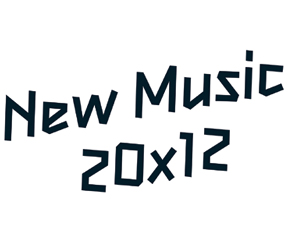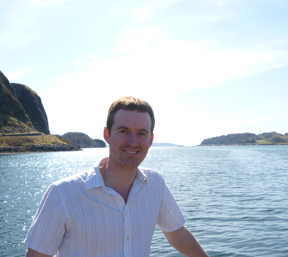Oliver Searle, commissioned by Drake Music Scotland
‘Technophonia’
Special thanks to Creative Scotland for making this New Music 20×12 commission possible.
PRS for Music Foundation: What impact do you think your involvement in New Music 20×12 will have on your work?
Oliver Searle: I am always intrigued by projects that I have never been involved in before, and enjoy the challenge of having to re-invent the way I work as a composer every time I begin a piece (I always think that if you are finding composition easy, it’s not worth doing!). Every time I begin a new process (or complete it), it has a profound effect upon future ways of working and this project in particular, will no doubt alter my approach to musical performers and the way in which they are integrated into an ensemble.
PRSF: Tell us the story of how and why you joined forces with the performers you are working with on this project.
OS: I had heard a lot about Drake Music Scotland in the past, but had never met any of the individuals involved in the organisation. I was interested in being included in a project such as this, due to my research with cochlear implant users around the world (most recently I have been touring a piece of music theatre for young, deaf children), and have long been intrigued by creating an environment in which people who often do not get the opportunity to listen to music, and perform, are able to do so.
PRSF: How are you going to approach creating your new work? What kinds of creative input will the performers and community you are working with have on your work?
OS: The performers in this work will have a direct role in the creative process, as I will be working with several individuals directly, quite some time before the direction of the overall piece is decided, to develop what they are able to do on each of their chosen instruments, as well as to encourage improvisation as a means to create blocks of musical material. This will feed into the final composition, influencing the ultimate direction, structure and soundworld of the finished piece.
PRSF: Who do you hope to reach through the creation and performance of this work and what do you hope they’ll take away with them?
OS: The plan is to perform this work in several cities, thus reaching a wide audience of people. Also, due to the very nature of this work and its performers (using instruments such as Brainfingers and Skoog), we hope that those who experience it live will rethink their attitudes towards the nature of musical performance.
PRSF: Where do you draw your inspiration and influences? Which creator – musical or otherwise – do you most admire?
OS: Writing music for me has always been quite an introspective and personal experience and I am unsure how I would approach writing music which acted as a direct response to another, external artwork. Instead, I am interested in realising my own response to external influences (which often relates to my own life experience), which might include an idea sparked by an emotion raised while listening, reading, or viewing material. However, I also listen to a vast array of music and would like to think that some of this turns up in my work from time to time; anything from jazz to heavy metal and beyond!
PRSF: Which Olympic and/or Paralympic Games will you be seeing in 2012? What was your best/favourite sport when you were growing up?
OS: I would be happy to see any of the Games next year, as I was involved in a lot of sports when I was younger (unfortunately, time issues now restrict my involvement in quite so much!), such as squash, tennis, swimming and cycling. I still find the time to swim, which I love (as a lunchtime break from composing!), so this would probably be top of my list to witness live!
A message with commissioning organisation Drake Music Scotland
Technophile’ will be written for a new kind of ensemble bringing together cutting edge music interfaces used by Drake Music Scotland – Soundbeam, Brainfingers with Notion software and the newly developed Skoog – played by young disabled musicians and a group of their peers on more conventional orchestral and electronic instruments. Oliver Searle’s music will challenge and inspire the young musicians to combine their individual talents to achieve a unique team performance, a 12-minute musical event that will stir their audience and stimulate them to think again about what is possible, as well as how we define musical instruments and performing musicians.


